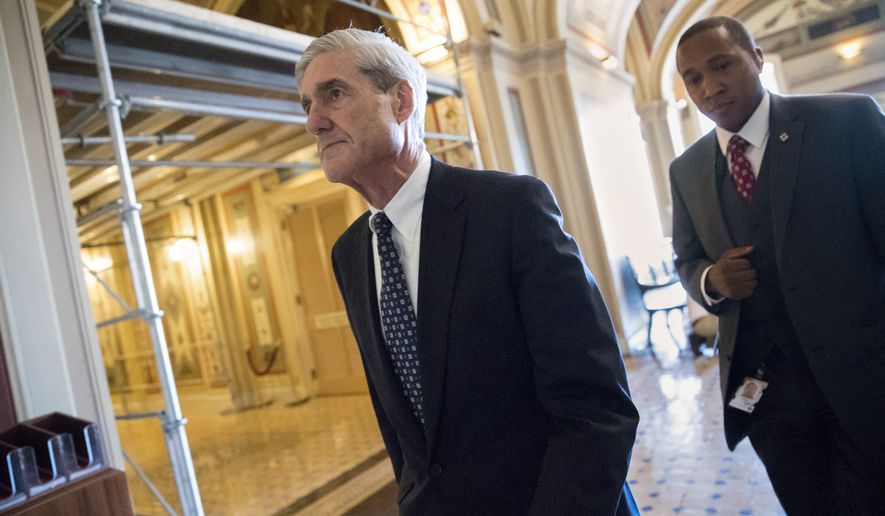One of the lawyers whom special counsel Robert Mueller has hired to investigate President Trump is pulling double duty, still working part time as a deputy solicitor general in the Justice Department.
The curious arrangement may not pose a direct conflict of interest, ethics analysts said, but it does leave Michael Dreeben on a team investigating Mr. Trump even as he serves as the executive branch’s attorney overseeing the Justice Department’s criminal docket before the Supreme Court.
“The whole point of the special counsel is to insulate him and his staff from the Trump administration,” said Jonathan Turley, a constitutional law professor at George Washington University. “Having one of your chief deputies working simultaneously for the special counsel and the solicitor general’s office can create a rather novel division of labor.”
Mr. Dreeban is the only person on the 13-member team still holding another job. All of the lawyers who were in private practice resigned from their firms, while government lawyers plucked from within various branches of the Justice Department have taken leave of their posts and are on full-time detail to Mr. Mueller.
Representatives for both the Justice Department and the special counsel confirmed that the Justice Department approved the arrangement.
“Michael Dreeben is working on legal issues as a counselor in the special counsel’s office while retaining certain responsibilities as deputy solicitor general to ensure continuity of representation of the United States in the Supreme Court,” said Justice Department spokesman Peter Carr, who declined to discuss any steps taken to compartmentalize Mr. Dreeben’s dual roles.
He declined to comment beyond that, saying the department does not discuss personnel staffing matters.
Mr. Dreeben is a highly regarded lawyer who has worked in the solicitor general’s office for 28 years, achieving the rare distinction of arguing his 100th case before the Supreme Court last year.
Still, ethics analysts outlined a few of the ways in which a conflict of interest could emerge.
One scenario could include a situation in which Mr. Dreeben argued a position for the solicitor general that conflicts with a stance that the special counsel wants to take.
“He’s working with Bob Mueller in the interest of building a prosecutorial case,” Mr. Turley said. “It may raise some questions if he’s also representing the U.S. in trying to expand the definitions of crimes that might be brought against the president.”
Of the 21 full-time attorneys working for the solicitor general, the special counsel’s investigation has also pulled appellate lawyer Elizabeth Prelogar away from the office, but on full-time detail.
Kathleen Clark, an ethics law professor at Washington University in St. Louis, laid out another problematic scenario in which the solicitor general’s office argued for a narrow view of immunity for the president and Mr. Mueller’s team later sought to bring criminal charges against Mr. Trump.
With so little known about exactly what Mr. Mueller’s team is pursuing, Ms. Clark said, she wasn’t aware of any such positional conflict in play.
Even with Mr. Dreeben’s years of experience, ethics analysts say, precautions should be taken to prevent any conflict between his two positions — including a strict ban on any work for the special counsel on any solicitor general computers or accounts. The special counsel has a computer network set up separately from the Justice Department for the investigation.
Another precaution would be to set boundaries for recusal by Mr. Dreeben from any cases taken up by the solicitor general’s office that have the potential for overlap with Mr. Mueller’s probe.
“It would probably not be a good time to be working on overlapping matters that might create the appearance that the special counsel’s office is being directed by the solicitor general’s office,” said Richard Painter, who was a White House ethics counsel under President Bush. “You can easily avoid that by staying away from related matters over at the solicitor general’s office.”
But he estimated that the number of cases under review by the solicitor general’s office that could overlap are likely few and far between.
“Probably 98 percent of work at the solicitor general’s office has nothing to do with what Mueller is doing,” he said.
Knowing his reputation as a former FBI director, others expect Mr. Mueller would have evaluated and planned for such matters.
Rep. Michael K. Conaway, who took over the Russia investigation by the House Permanent Select Committee on Intelligence after the recusal of Chairman Devin Nunes, California Republican, said he expects Mr. Mueller would have gone to great lengths to ensure his assembled team is “scrupulously devoid” of any perceived conflicts of interest.
“I would think Mr. Mueller would want to be squeakier clear that Caesar’s wife in terms of whatever he does and whatever decisions he makes in order to maintain the appearance of integrity in everything he does,” said Mr. Conaway, Texas Republican.
He said he was not familiar with Mr. Dreeben’s background.
But Ms. Clark noted that Mr. Dreeben’s work in both roles at once isn’t necessarily a conflict in and of itself. Although Mr. Dreeben might play a role in defending policy established by Mr. Trump, it isn’t the same as defending the president himself.
“The Justice Department, through the solicitor general’s office and Mueller, represents the interests of the United States, not the interest of Donald Trump,” she said.
• Andrea Noble can be reached at anoble@washingtontimes.com.




Please read our comment policy before commenting.